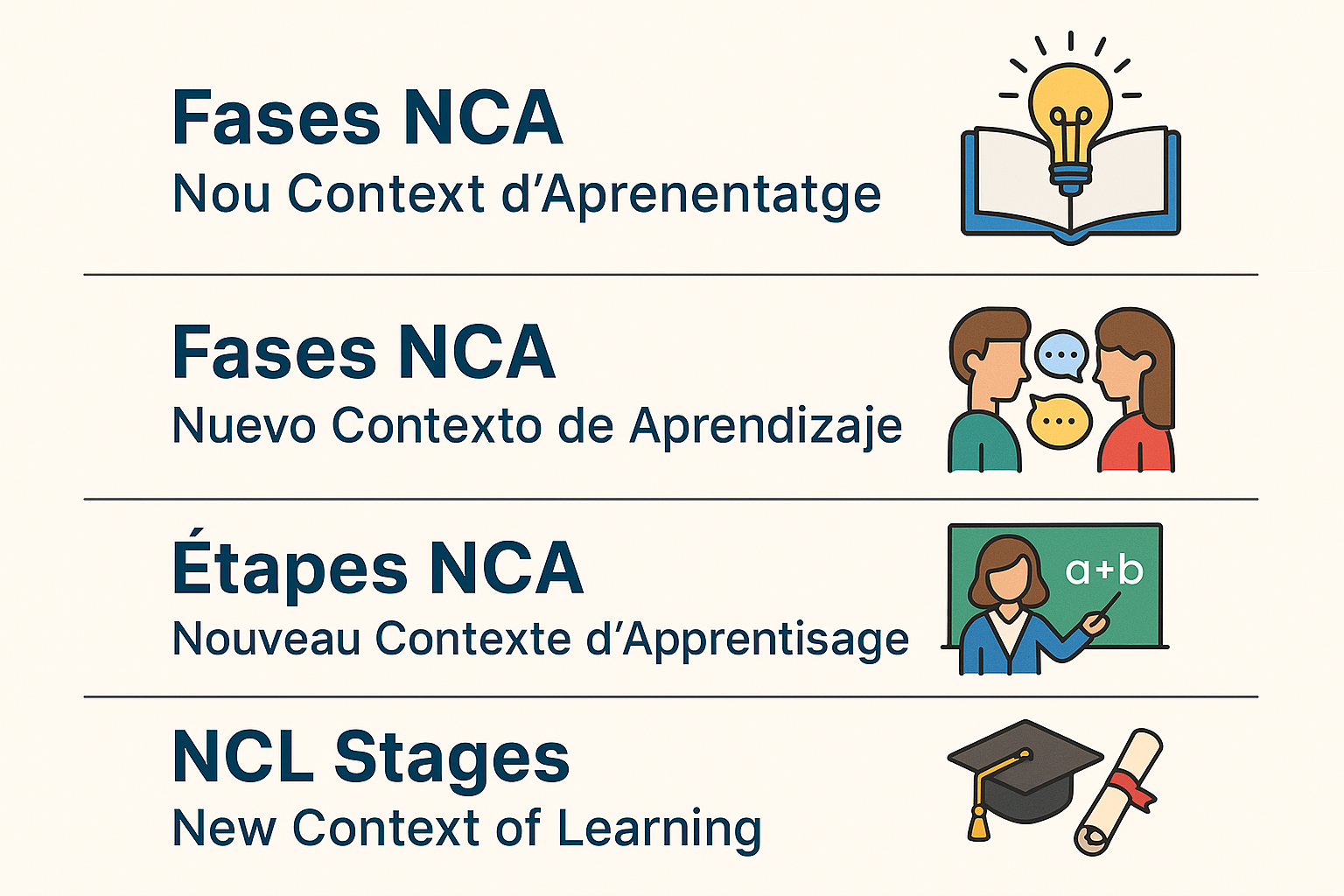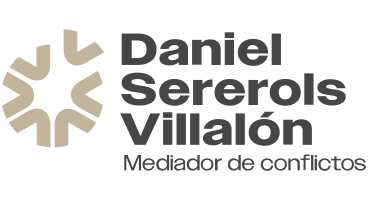
07 Sep The NCL Phases in Education and Their Connection with Conflict Mediation
The NCL Phases in Education and Their Connection with Conflict Mediation
Part I. The NCL Phases in Education
The New Context for Learning (NCL) is a pedagogical model launched in Catalonia by Jesuïtes Educació in 2014, and later adopted by La Salle in its educational project. Its aim is to place the student at the center of the learning process, fostering creativity, critical thinking, teamwork, and personal responsibility.
The process is structured into five phases: welcome, explore, ideate, materialize, and closure. These stages ensure a complete learning experience — emotional, cognitive, practical, and reflective — and are connected to methodologies such as Kolb’s experiential learning cycle and design thinking.
- Welcome
This is the preparation and motivation stage.
- Atmosphere: more than decorating a space, it is about transforming it into an environment that invites learning. Music, different lighting, circular table arrangements, or a symbolic object can create a special atmosphere and communicate: “Something different and important is happening here.”
- Activation of prior knowledge: before starting, the student connects what they already know with what they are about to discover. Initial questions, brainstorming, concept maps, or small challenges help build bridges to the new topic.
- Materials and tools: the choice of resources is key to generating expectations. Surprising objects, audiovisual clips, current articles, or digital apps not only provide information but also spark curiosity.
- Explaining the challenge: it is presented clearly and attractively, connecting with the “why” and the “for what.” This connection with reality motivates and makes the student feel part of a meaningful experience.
- Confidence in the student: the teacher conveys confidence that the student is capable of overcoming the challenge. A positive attitude and encouraging messages foster involvement and self-esteem.
- Explore
The research and comprehension stage.
- Research: students learn to search for information from varied sources: books, the internet, expert interviews, field visits. This strengthens their autonomy and critical spirit.
- Understand and contextualize: it is not enough to collect data; students must understand what it means and why it matters. This step helps connect knowledge to other disciplines and real-life situations.
- Express ideas and opinions: debates, oral presentations, and small group discussions give each student a voice and encourage argumentation and listening skills.
- Teacher guidance: the teacher accompanies with open-ended questions, helps focus research, and encourages comparing information. They guide but do not give closed answers.
- Ideate
The creative stage of the process.
- Inspire and decide: divergent thinking is encouraged. Students generate many options without judging them at first (brainstorming, mind maps, creative techniques).
- Evaluate solutions: afterwards, the options are assessed based on feasibility, resources, and available time.
- Promote conclusions: the group decides together which path to follow. This shared decision-making fosters responsibility and collective commitment.
- Connection with the real world: challenges from companies, institutions, or local communities may be introduced. Students see that their work has an impact beyond the classroom, boosting motivation and meaning.
- Materialize
Turning ideas into concrete actions.
- Plan and execute: students set goals, divide tasks, and assign roles, developing project management skills.
- Document and present: the process is recorded in journals, videos, digital presentations, or posters. Documenting helps students become aware of their progress and communicate results.
- Results: these take the form of a final product (a model, exhibition, report, artistic work, or community service). Both the process and the outcome are educationally valuable.
- Time management: students learn to prioritize and meet deadlines. The teacher supports them to maintain quality.
- Proper use of language: vocabulary, spelling, coherence, and textual cohesion are reviewed to ensure rigor and clarity.
- Closure
The reflective and evaluative stage.
- Evaluation and feedback: the teacher and peers provide constructive feedback.
- Self-evaluation: students reflect on their involvement, time management, and results.
- Personal reflection: each student identifies useful learning beyond the content itself: new skills, strengths, challenges overcome, and strategies to improve.
Part II. Connection with Conflict Mediation
Although it originates in the educational field, the NCL phases show a remarkable similarity to the stages of a conflict mediation process, as both methodologies share the same vision: the person is the active protagonist of the process.
- Welcome
- Education: atmosphere, activation, trust.
- Mediation: initial session, explanation of the process, establishing ground rules, and building trust.
- Explore
- Education: research, understanding, contextualization.
- Mediation: understanding positions and needs, giving voice to all parties, expressing emotions.
- Ideate
- Education: inspire, generate options, evaluate.
- Mediation: generate alternative solutions, assess them, and find mutually satisfactory outcomes.
- Materialize
- Education: plan, execute, document.
- Mediation: formalize agreements, put them in writing, and establish mutual commitments.
- Closure
- Education: evaluation and personal reflection.
- Mediation: review of agreements, assessment of the process, and reflection on managing future conflicts.
Final Reflection
In both education and mediation, the NCL phases demonstrate that processes are not limited to solving a specific problem but aim to develop capacities: creativity, collaboration, communication, and responsibility.
NCL and mediation share the same philosophy: accompanying people so they can become protagonists of their own transformation.
References and Resources
- Jesuïtes Educació – Nou Context d’Aprenentatge (NCA)
- La Salle – Nou Context d’Aprenentatge (NCA) Nou Context d’Aprenentatge (NCA) – Colegios La Salle
- Kolb, D. A. (1984). Experiential Learning: Experience as the Source of Learning and Development. Prentice Hall.
- IDEO (2013). Design Thinking for Educators.

Sorry, the comment form is closed at this time.